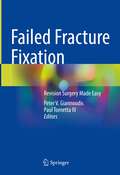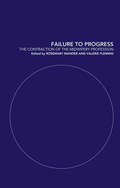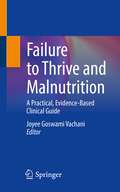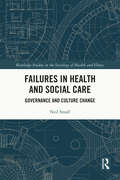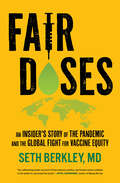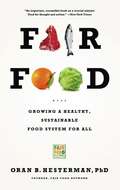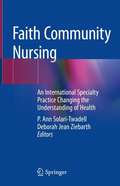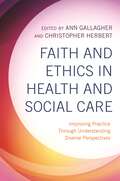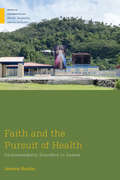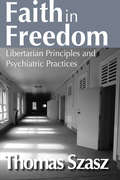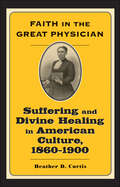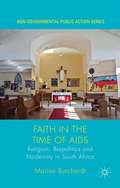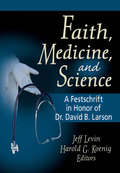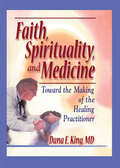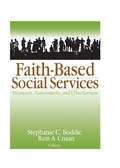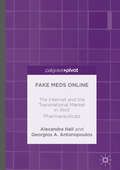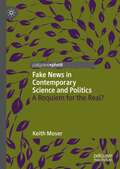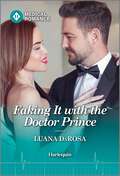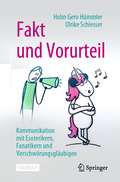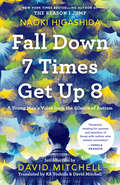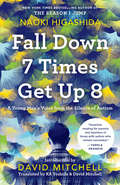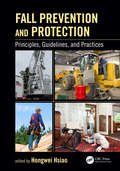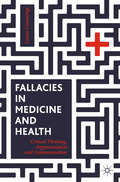- Table View
- List View
Failed Fracture Fixation: Revision Surgery Made Easy
by Peter V. Giannoudis Paul Tornetta IIIThis first edition text book describes applicable step-wise approaches to successfully manage patients with failed fracture fixation. Cases are presented for a range of anatomical sites focusing on the aetiology of the failure, clinical examination along with the necessary investigations required for the initial patient assessment, pre-operative planning and its successful execution. Emphasis is placed on detailing when the timing of an intervention is required. A "tips and tricks" section is provided in each chapter enabling the reader to familiarize themselves with potential pitfalls associated with each technique covered and further develop their understanding of the content covered.Failed Fracture Fixation: Revision Surgery Made Easy is a comprehensive practically applicable guide to understand the aetiology of failure and to become familiar on how to use a range of relevant surgical techniques in a variety of anatomical sites to provide the patient with optimum conditions for a successful clinical and functional outcome. Therefore, it is an essential resource for trainee and practicing orthopedic surgeons seeking up-to-date guidance on how to apply the latest methodologies into their daily practice.
Failure to Progress: The Contraction of the Midwifery Profession
by Rosemary Mander Valerie FlemingChanges in the field of midwifery are of concern to those within the health care system, the academic world and those whose lives are touched by midwifery care. This text reflects on the current situation and questions whether it is the most appropriate way of providing care for the childbearing woman. The book discusses what is happening both within midwifery as well as to midwifery as a profession in the context of social change. Topics covered include:* the evolution of the midwifes role* women's issues* the functioning of the midwife within the health care system* the effects of organisational change* the relationships of the midwife with the woman she cares for and with medical practitioners.All of the contributors to Failure to Progress are actively involved with the provision of care to the childbearing woman, and most are practising midwives. Together they build up a comprehensive picture of midwifery today which will be relevant to all midwifery students, practitioners and policy makers and not least to the consumers of midwifery care.
Failure to Thrive and Malnutrition: A Practical, Evidence-Based Clinical Guide
by Joyee Goswami VachaniFailure to Thrive (FTT) is a multifactorial illness requiring the systematic application of evidence in conjunction with a multidisciplinary team-based approach. Evidence suggests most cases of FTT can be diagnosed using key elements of the patient history and physical examination including appropriate growth assessment, and that laboratory testing is usually unhelpful in determining an etiology. Despite this, there is wide variation in the definition, evaluation, treatment, costs, and outcomes of FTT patients, with subsequent burdens on the healthcare system. A suggested approach to the differential diagnosis and management of FTT is to review calories – inadequate caloric intake, excessive calorie losses, and/or increased caloric intake (i.e. increased metabolic demand) – while acknowledging the available resources along the continuum of patient care. Implementing evidence-based practice for FTT provides improvement opportunities for providers and potentially has significant impact on the healthcare system. This book is designed to present a practical and concise handbook on the diagnosis and management of failure to thrive (FTT)/ malnutrition for quick reference by trainees and practitioners by using case examples and available evidence in the current literature. This book is divided into 7 chapters in a logical progression of defining, diagnosing, and managing FTT with cases in each chapter to further illustrate evidence-based care.
Failures in Health and Social Care: Governance and Culture Change
by Neil SmallThis thought-provoking book examines breakdowns in the quality of health and social care over the past decade, exploring governance failures and the challenges of achieving lasting change. Failures in care have been manifest across many different settings. Drawing on examples from care of older people and end-of-life care, as well as from learning disabilities, mental health, maternity care and services for vulnerable children, Neil Small shows that the same sorts of problems are evident across these settings and that they are occurring up to the present day. Discussing culture change alongside levels of funding and the impact of prevailing political and economic orthodoxies, and through the lens of shifts of trust in society, this book argues that the concept of culture must be cast much wider than organisational and professional cultures if change is to be secured. This book engages with how to improve quality of care in the NHS and welfare systems more generally. Its case examples are from the UK but the issues of governance, culture change and shifts in the social contract that failures illuminate have an international relevance. It is important reading for those with an interest in health, social care, political science, and sociology.
Fair Doses: An Insider's Story of the Pandemic and the Global Fight for Vaccine Equity
by Seth BerkleyHow vaccines became the world's most powerful and widely distributed health intervention, and the inside story of the challenging race to deliver COVID-19 vaccines globally.Fair Doses is a story of vaccines: how they came about, why they are important, and how they have been made globally available—although our quest for vaccine equity is still ongoing. In this fascinating deep dive into vaccines, Dr. Seth Berkley, an internationally recognized infectious disease epidemiologist and public health leader, offers an inside view of the challenges of developing and disseminating vaccines for a broad swath of illnesses, from Ebola to AIDS to malaria and beyond. COVID-19 was a lesson about the devastation a novel virus can bring on our world. When the first signs of this new infection appeared, Dr. Berkley co-created COVAX, a global initiative aimed at ensuring equitable vaccine distribution. The COVAX team had to navigate vaccine nationalism, vaccine diplomacy, intentional disinformation, political forces, and the conflicting incentives of vaccine companies in its race against the virus. In record time, the group organized 193 countries, raised more than $12 billion, built the world's largest portfolio of COVID-19 vaccines, and delivered two billion doses to 146 countries. Future pandemics are an evolutionary inevitability, and future global response needs to be much faster and more equitable. Drawing from his personal experience, Dr. Berkley lays out a bold vision of preparedness that will help the global community take advantage of rapid advancements in science to make our world safer from infectious diseases.
Fair Food: Growing a Healthy, Sustainable Food System for All
by Oran HestermanOur food system is broken, and it’s endangering what’s most precious to us: our environment, our health, our soil and water, and our future. In recent years, a host of books and films have compellingly documented the dangers. But advice on what to do about them largely begins and ends with the admonition to "eat local” or "eat organic. ” Longtime good food pioneer Oran Hesterman knows that we can’t fix the broken system simply by changing what’s on our own plates: the answer lies beyond the kitchen. InFair Foodhe shares an inspiring and practical vision for changing not only what we eat, but how food is grown, packaged, delivered, marketed, and sold. He introduces people and organizations across the country who are already doing this work in a number of creative ways, and provides a wealth of practical information for readers who want to get more involved.
Faith Community Nursing: An International Specialty Practice Changing the Understanding of Health
by P. Ann Solari-Twadell Deborah Jean ZiebarthA multi-authored book, with editors and authors who are leaders in Faith Community Nursing (FCN) that aims to address contemporary issues in faith-based, whole person, community based health offering cost effective, accessible, patient centered care along the patient continuum while challenging contemporary health policy to include more health promotion services. Twenty-five chapters take the reader from a foundational understanding of this historic grass-roots movement to the present day international specialty nursing practice. The book is structured into five sections that describe both the historical advancement of the Faith Community Nursing, its current implications and future challenges, taking into account the perspectives of the pastor, congregation, nurse, health care system and public health national and international organizations. The benefits of this book are that it is intended for a mixed audience including lay, academic, medical professionals or health care executives. By changing the mindset of the reader to see the nurse as more than providing illness care, the faith community as more than a place one goes to on Sunday and health as more than physical, creative alternatives for promoting health emerge through Faith Community Nursing.
Faith and Ethics in Health and Social Care: Improving Practice Through Understanding Diverse Perspectives
by Ann Gallagher Christopher HerbertThis textbook looks at how different world faiths approach ethics in health and social care, and how their faith informs their practice. Equipping practitioners with the information the need, it will support them to be more reflective regarding spirituality, ethics and their provision of care.
Faith and the Pursuit of Health: Cardiometabolic Disorders in Samoa (Medical Anthropology)
by Jessica HardinFaith and the Pursuit of Health explores how Pentecostal Christians manage chronic illness in ways that sheds light on health disparities and social suffering in Samoa, a place where rates of obesity and related cardiometabolic disorders have reached population-wide levels. Pentecostals grapple with how to maintain the health of their congregants in an environment that fosters cardiometabolic disorders. They find ways to manage these forms of sickness and inequality through their churches and the friendships developed within these institutions. Examining how Pentecostal Christianity provides many Samoans with tools to manage day-to-day issues around health and sickness, Jessica Hardin argues for understanding the synergies between how Christianity and biomedicine practice chronicity.
Faith in Freedom: Libertarian Principles and Psychiatric Practices
by Thomas SzaszThe libertarian philosophy of freedom is characterized by two fundamental beliefs: the right to be left alone and the duty to leave others alone. Psychiatric practice routinely violates both of these beliefs. It is based on the notion that self-ownership—exemplified by suicide—is a not an inherent right, but a privilege subject to the review of psychiatrists as representatives of society. In Faith in Freedom, Thomas Szasz raises fundamental questions about psychiatric practices that inhibit an individual's right to freedom.His questions are fundamental. Is suicide an exercise of rightful self-ownership or a manifestation of mental disorder? Does involuntary confinement under psychiatric auspices constitute unjust imprisonment, or is it therapeutically justified hospitalization? Should forced psychiatric drugging be interpreted as assault and battery on the person or is it medical treatment?The ethical standards of psychiatric practice mandate that psychiatrists employ coercion. Forgoing such "intervention" is considered a dereliction of the psychiatrists' "duty to protect." How should friends of freedom—especially libertarians—deal with the conflict between elementary libertarian principles and prevailing psychiatric practices? In Faith in Freedom, Thomas Szasz addresses this question more directly and more profoundly than in any of his previous works.
Faith in the Great Physician: Suffering and Divine Healing in American Culture, 1860–1900 (Lived Religions)
by Heather D. CurtisThis history of evangelical faith healing in nineteenth-century America examines the nation’s shifting attitudes about sickness, suffering, and health. Faith in the Great Physician tells the story of how participants in the divine healing movement transformed the ways Americans coped with physical affliction and pursued bodily wellbeing. Heather D. Curtis offers critical reflection on the theological, cultural, and social forces that come into play when one questions the purpose of suffering and the possibility of healing.Belief in divine healing ran counter to a deep-seated Christian ethic that linked physical suffering with spiritual holiness. By engaging in devotional disciplines and participating in social reform efforts, proponents of faith cure embraced a model of spiritual experience that endorsed active service, rather than passive endurance, as the proper Christian response to illness and pain.Emphasizing the centrality of religious practices to the enterprise of divine healing, Curtis sheds light on the relationship among Christian faith, medical science, and the changing meanings of suffering and healing in American culture.Recipient of the Frank S. and Elizabeth D. Brewer Prize of the American Society of Church History for 2007
Faith in the Time of AIDS: Religion, Biopolitics And Modernity In South Africa (Non-governmental Public Action Ser.)
by Marian BurchardtFaith, Medicine, and Science: A Festschrift in Honor of Dr. David B. Larson
by Harold G KoenigA perfect introduction to the connection between religious faith and physical and mental health! Faith, Medicine, and Science: A Festschrift in Honor of Dr. David B. Larson is a comprehensive collection of groundbreaking work from one of the principal figures in the establishment, expansion, and acceptance of scientific research at the interface of religion, spirituality, and health. Dr. Jeff Levin and Dr. Harold G. Koenig honor their late colleague with a retrospective of his writings on the impact of religious faith and identity on physical and mental health and on a variety of social issues, including criminal behavior, substance abuse, mental illness, juvenile delinquency, reproductive decisions, marital satisfaction, family functioning, and the quality of life. The book also features a concise history of the religion and health field, a biography of Dr. Larson, and tributes, essays, and remembrances from the leading figures in the field. Faith, Medicine, and Science honors Dr. Larson&’s role in raising awareness of the health effects of religious faith and his vision and efforts in establishing coursework on religion and spirituality within undergraduate and graduate medical education programs. His body of theoretical and empirical writings serves as a permanent record of the powerful role played by religion and spirituality, and his work stands as a lasting contribution to science, medicine, and society. These articles combine with the book&’s supplemental features to provide social and behavioral scientists, medical researchers, and clinicians with an essential resource for clinical research and education. Topics examined in Faith, Medicine, and Science include: the religious life of alcoholics religion, spirituality, and mortality the impact of religion on men&’s blood pressure the systematic analysis of research on religious variables a systematic review of nursing home research religious affiliations in mental health research samples as compared with national samples the associations between dimensions of religious commitment and mental health and much more! Faith, Medicine, and Science: A Festschrift in Honor of Dr. David B. Larson documents the work of one of the most important writers on the interface of the human spirit and the healing arts. His death in 2002 at the age of 54 remains a profound loss, but through this book, his pioneering research will continue to serve as a thorough and accessible introduction to the religion and health field.
Faith, Spirituality, and Medicine: Toward the Making of the Healing Practitioner
by Harold G Koenig Dana E KingUnderstand and make use of the connections between health and religion to improve your practice!Research points to a clear link between people's religious beliefs and practices and their health. These developments have ushered in a new era in health care, in which meaning and purpose stand alongside biology as vital factors in health outcomes. Now the gap is closing between medicine and religion, as evidenced by the more than 60 US medical school courses now being given in spirituality, religion, and medicine, including courses at major teaching centers such as Harvard, Johns Hopkins, Brown, Case-Western, and others.Faith, Spirituality, and Medicine: Toward the Making of the Healing Practitioner promotes the integration of spirituality into medical care by exploring the connection between patient health and traditional religious beliefs and practices. This useful guide emphasizes basic, easily understood principles that will help health professionals apply current research findings linking religion, spirituality, and health. Faith, Spirituality, and Medicine does not advocate any particular set of beliefs or evangelize as it helps you integrate spiritual care into the care of patients by showing you how to: take a patient's spiritual history correlate religious beliefs with health beliefs address the individual spiritual needs of your patients choose a course of treatment that is in agreement with the religious belief of the patient incorporate appropriate clergy into treatment plansFaith, Spirituality, and Medicine describes a biopsychosocial-spiritual model that emphasizes the need to view patients not simply as biological creatures, but as physical, psychological, social, and spiritual beings if they are to be effectively treated and healed as whole persons.
Faith-Based Social Services: Measures, Assessments, and Effectiveness
by Ram A. Cnaan Stephanie C. BoddieRead the latest studies on the effectiveness of religious-based services—and the problems revealed in the assessmentThe Charitable Choice provision and the Bush Administration’s National Faith-Based Initiative have broadened the scope of social services delivered through faith-based organizations. There are expectations that these faith-based social service providers will be more effective—but how should that effectiveness be measured? Faith-Based Social Services: Measures, Assessments, and Effectiveness explains the nature and quality of religion-based social service delivery while serving as a point of reference for future research and work. This unique source tackles the important, complex issue of measuring the effectiveness of faith-based social services in comparison to secular services while providing analysis of the latest available studies.Faith-Based Social Services: Measures, Assessments, and Effectiveness provides a conceptual analysis of FBOs (faith-based organizations) that reflects the need to gather detailed studies to assess social service effectiveness while reviewing the crucial issues challenging public policy. The latest empirical research is detailed, including the problems found when comparing secular and faith-based social service providers, their organizational structures, and the types of services offered. Analysis is included of the data from a three-state evaluation of welfare to work programs, a study of four types of faith-based services found in four cities, and an assessment of a church-based program for teenage drop-outs. Topics in Faith-Based Social Services: Measures, Assessments, and Effectiveness include: discussion on how social science research shunned faith-based services and how this neglect affected effectiveness problems inherent in efficacy assessment making funding priorities decisions the causes of outcome differences a model of evaluation based on randomized controlled clinical trials using measurement practices currently used by the nonprofit sector comparative case studies in transitional housing, parent education, and residential substance abuse treatment programs latest analysis of research involving faith-based organizations and the provided services’ efficacy much more! Faith-Based Social Services: Measures, Assessments, and Effectiveness is illuminating reading, perfect for social work professionals, students, educators, sociologists, religious leaders, and seminary educators.
Fake Fiancée to Forever?
by Sue MacKayIn the latest Harlequin Medical Romance by Sue MacKay, will a pretend engagement lead to happily-ever-after for the nurse and her surgeon?A short-term solution…with a long-term consequence! Nurse Matilda Simmons travels the world to forget her past, and surgeon Lachlan McRae understands why she won&’t settle down—he has no intention to marry again either. So she accepts Lachlan&’s temporary diamond ring to help him out, knowing it comes with little risk. They both know it&’s not real despite their sizzling attraction. Only, their passion soon leads to an unexpected revelation that will bind them forever…From Harlequin Medical: Life and love in the world of modern medicine.
Fake Meds Online
by Alexandra Hall Georgios A. AntonopoulosThis book provides a timely criminological investigation into the rapidly growing sale of fake medicines online. Some estimates suggest that the fake medicine trade has now overtaken marijuana and prostitution as the world's largest market for criminal traffickers. This increase has been particularly apparent in the context of various evolutionary phases in information and communications technologies, and the Internet now acts as the main avenue through which this criminal market is expanding. Thus far - despite growing concern and media attention - this extensive, extremely profitable, and ultimately life-threatening online market is yet to be fully explored. Drawing on the authors' own criminological investigation of both the supply and demand sides in the United Kingdom, this study offers the first in-depth and empirically-grounded analysis of the online trade in illicit medicines. Founded on rigorous research, and bolstering a rich area for debate, this book will be of particular interest for scholars of criminology and technology studies.
Fake News in Contemporary Science and Politics: A Requiem for the Real?
by Keith MoserThis transdisciplinary book investigates the profound repercussions of living in a post-truth world in which 'alternative facts' and post-truth knowledge claims, often bordering on the absurd, have replaced the real in the collective imagination of millions of people around the planet. Through discussions on climate change denial, the anti-vaccination movement, the January 6th Insurrection and the Russia-Ukraine War, this study explores the gravity of the current 'infodemic,' or the increasing inability of a large segment of the population to distinguish between reality and misrepresentation, and the destabilizing impact this infodemic has on democratic models of governance around the globe, coinciding with the rise of autocratic forms of populism.
Fake Silk: The Lethal History of Viscose Rayon
by Paul David BlancWhen a new technology makes people ill, how high does the body count have to be before protectives steps are taken? This disturbing book tells a dark story of hazardous manufacturing, poisonous materials, environmental abuses, political machinations, and economics trumping safety concerns. It explores the century-long history of “fake silk,” or cellulose viscose, used to produce such products as rayon textiles and tires, cellophane, and everyday kitchen sponges. Paul Blanc uncovers the grim history of a product that crippled and even served a death sentence to many industry workers while also releasing toxic carbon disulfide into the environment. Viscose, an innovative and lucrative product first introduced in the early twentieth century, quickly became a multinational corporate enterprise. Blanc investigates industry practices from the beginning through two highly profitable world wars, the midcentury export of hazardous manufacturing to developing countries, and the current “greenwashing” of viscose as an eco-friendly product. Deeply researched and boldly presented, this book brings to light an industrial hazard whose egregious history ranks with those of asbestos, lead, and mercury.
Faking It with the Doctor Prince
by Luana DaRosaIn Luana DaRosa's latest Harlequin Medical Romance, Dr. Valerie agrees to a fake relationship with her royal boss… RESISTING HER ROYAL BOSS! Sports nutritionist Dr. Valerie isn&’t sure what surprises her more: that her boss is a prince, or that he needs a fake date! Dr. Ethan, head physician of their cycling team, must bring a girlfriend to the upcoming gala, or his father will sell their team. Valerie is his only hope—though after her last workplace entanglement ended disastrously, she mustn&’t give in to temptation. But with their jobs on the line, she can&’t refuse. It&’s just one event—surely she can resist him for that long…From Harlequin Medical: Life and love in the world of modern medicine.
Fakt und Vorurteil: Kommunikation mit Esoterikern, Fanatikern und Verschwörungsgläubigen
by Holm Gero Hümmler Ulrike SchiesserBeim Kaffeetrinken mit der Familie wird Ihnen energetisiertes Wasser angeboten. Auf Twitter diskutieren Sie mit Impfgegnern. Die WhatsApp-Kitagruppe diskutiert Sternzeichen, die Apotheke verkauft Ihnen Globuli, die Nachbarin missioniert für ihren Guru und die Nachrichten beschäftigen sich schon wieder mit Demonstrationen von Rechtsextremen.Überall begegnen Ihnen Verschwörungsmythen, Aberglaube, Esoterik, Pseudowissenschaften und Co. und Sie möchten darauf reagieren – dabei möglichst sachlich bleiben, Ihren Standpunkt klarstellen, Fakten liefern, aber auch nicht unnötig provozieren oder überladen. Außerdem möchten Sie Ihr Gegenüber nicht verletzen, aber zum Umdenken anregen. Doch wie gelingt das?Wenn Sie sich diese Frage stellen, lesen Sie „Fakt und Vorurteil“. Verstehen Sie, warum wir von Emotionen gesteuert sind und die meisten Informationen an uns abprallen. Lesen Sie Erfahrungen und Tipps aus Interviews mit professionellen (Wissenschafts-)Kommunikatoren. Verfolgen Sie dann unterschiedliche Personen durch ihre eigenen Umdenkprozesse: Was überzeugt einen Alternativmediziner davon, nichtevidenzbasierte Medizin hinter sich zu lassen? Was war ausschlaggebend für eine ehemalige Impfgegnerin, ihre Kinder doch impfen zu lassen? Was hilft Mitgliedern von vereinnahmenden Organisationen beim Ausstieg? Was bewegt ein gefeiertes Medium, sich aus der Esoterik zu lösen? Dieses Buch richtet sich an alle, die sich um Personen mit irrationalen Weltsichten sorgen oder nicht wissen, wie sie mit ihnen kommunizieren sollen – sei es in der Familie, im Freundeskreis, anonym im Internet oder bei der Arbeit. Die Autoren geben konkrete Tipps zu Diskussionen und Situationen und helfen auch dabei zu entscheiden, wann es wichtig ist sich zu engagieren und wann man sich lieber zurückzieht.
Fall Down 7 Times Get Up 8: A Young Man's Voice from the Silence of Autism
by David Mitchell Naoki Higashida Ka YoshidaA story never before told and a memoir to help change our understanding of the world around us, 13-year-old Naoki Higashida's astonishing, empathetic book takes us into the mind of a boy with severe autism. With an introduction by David Mitchell, author of the global phenomenon, Cloud Atlas, and translated by his wife, KA Yoshida.Naoki Higashida was only a middle-schooler when he began to write The Reason I Jump. Autistic and with very low verbal fluency, Naoki used an alphabet grid to painstakingly spell out his answers to the questions he imagines others most often wonder about him: why do you talk so loud? Is it true you hate being touched? Would you like to be normal? The result is an inspiring, attitude-transforming book that will be embraced by anyone interested in understanding their fellow human beings, and by parents, caregivers, teachers, and friends of autistic children. Naoki examines issues as diverse and complex as self-harm, perceptions of time and beauty, and the challenges of communication, and in doing so, discredits the popular belief that autistic people are anti-social loners who lack empathy. This book is mesmerizing proof that inside an autistic body is a mind as subtle, curious, and caring as anyone else's.
Fall Down 7 Times Get Up 8: A Young Man's Voice from the Silence of Autism
by David Mitchell Naoki Higashida Ka YoshidaFrom the author of the bestselling The Reason I Jump, an extraordinary self-portrait of life as a young adult with autism Naoki Higashida was only thirteen when he wrote The Reason I Jump, a revelatory account of autism from the inside by a nonverbal Japanese child, which became an international success. Now he shares his thoughts and experiences as a twenty-four-year-old man living each day with severe autism. In short, powerful chapters, Higashida explores school memories, family relationships, the exhilaration of travel, and the difficulties of speech. He also allows readers to experience profound moments we take for granted, like the thought-steps necessary for him to register that it’s raining outside. Acutely aware of how strange his behavior can appear to others, he aims throughout to foster a better understanding of autism and to encourage society to see people with disabilities as people, not as problems. With an introduction by bestselling novelist David Mitchell, Fall Down 7 Times Get Up 8 also includes a dreamlike short story Higashida wrote especially for this edition. Both moving and of practical use, this book opens a window into the mind of an inspiring young man who meets every challenge with tenacity and good humor. However often he falls down, he always gets back up.Advance praise for Fall Down 7 Times Get Up 8“Vibrant . . . In Mitchell and Yoshida’s deft translation, Higashida conveys this isolating mindset and his yearnings for connection and self-expression, in direct, evocative prose—his compulsive, restless motion, he writes, is ‘instinctual, like a wild animal running over a wide plain’—that provides readers with a window into a previously unknowable world.”—Publishers Weekly “Illuminating . . . Autism is a mysterious neurological condition. . . . Higashida gives us a thoughtful view of the art of living well in its shadow.”—Kirkus Reviews “Readers will find this older Higashida not only eloquent and thoughtful, but also wise, measured and, most of all, kind.”—BookPage“This book is essential reading for parents and teachers of those with autism who remain nonverbal.”—Temple Grandin, author of The Autistic Brain and Thinking in Pictures“Compelling insight on every single page, gently challenging assumptions you didn’t even know you held on how others ‘should’ process the social and physical environments around us.”—Ellen Notbohm, author of Ten Things Every Child with Autism Wishes You Knew
Fall Prevention and Protection: Principles, Guidelines, and Practices (Human Factors and Ergonomics)
by Hongwei HsiaoThis book covers a wealth of knowledge from experts and informed stakeholders on the best ways to understand, prevent, and control fall-related risk exposures. Featured are subjects on: (1) a public health view of fall problems and strategic goals; (2) the sciences behind human falls and injury risk; (3) research on slips, trips and falls; (4) practical applications of prevention and protection tools and methods in industrial sectors and home/communities; (5) fall incident investigation and reconstruction; and (6) knowledge gaps, emerging issues, and recommendations for fall protection research and fall mitigation.
Fallacies in Medicine and Health: Critical Thinking, Argumentation and Communication
by Louise CummingsThis textbook examines the ways in which arguments may be used and abused in medicine and health. The central claim is that a group of arguments known as the informal fallacies – including slippery slope arguments, fear appeal, and the argument from ignorance – undertake considerable work in medical and health contexts, and that they can in fact be rationally warranted ways of understanding complex topics, contrary to the views of many earlier philosophers and logicians. Modern medicine and healthcare require lay people to engage with increasingly complex decisions in areas such as immunization, lifestyle and dietary choices, and health screening. Many of the so-called fallacies of reasoning can also be viewed as cognitive heuristics or short-cuts which help individuals make decisions in these contexts. Using features such as learning objectives, case studies and end-of-unit questions, this textbook examines topical issues and debates in all areas of medicine and health, including antibiotic use and resistance, genetic engineering, euthanasia, addiction to prescription opioids, and the legalization of cannabis. It will be useful to students of critical thinking, reasoning, logic, argumentation, rhetoric, communication, health humanities, philosophy and linguistics.
